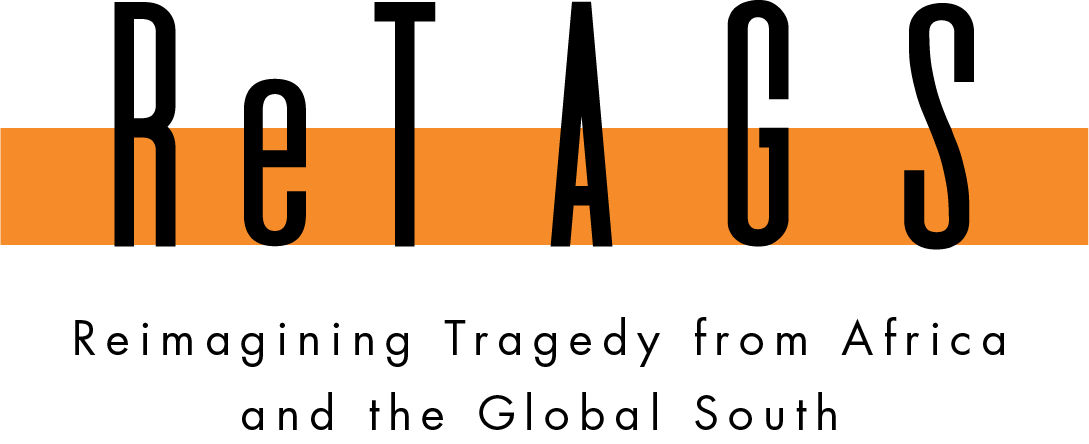PUBLIC PRESENTATIONS
These presentations have been specifically developed and created to share the work and findings of the ReTAGS research to an extrenal audience.
-
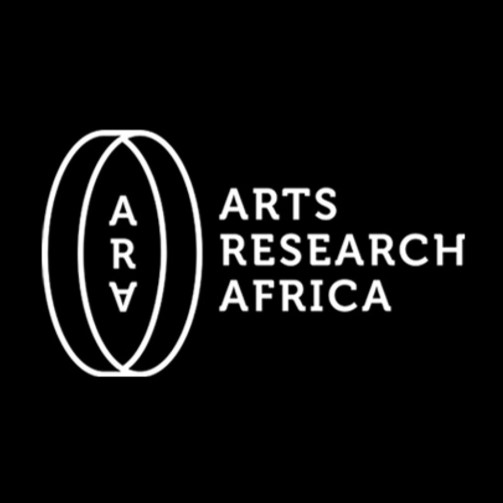
Jayne Batzofin & ReTAGS - the challenges of archiving performance-as-research
In this dialogue Prof Christo Doherty of ARA speaks to Jayne Batzofin, the digital archivist on the Reimagining Tragedy from African and the Global South (ReTAGS) project. This performance-as-research project is being led by Prof. Mark Fleishman with Mandla Mbothwe in the Centre for Theatre, Dance and Performance Studies at University of Cape Town. The project seeks to create space for an extended interrogation of the vast body of tragic works produced in the theatres of Africa, using performance methodologies as analytical tools to gain purchase on the complex realities of the colonial aftermath. It does this by investigating current events in the postcolony beyond the theatre, through the “prism of tragedy”. Of particular relevance to the theme of this podcast, the ReTAGS project endeavours to challenge the Eurocentric biases and preconceptions of Theatre Studies in two respects: firstly by shifting the perspective to Africa and the Global South thereby challenging the assumptions that align with what has been the predominant perspective in Theatre Studies; and secondly, by engaging in art practice as a mode of research in a central way alongside other more conventional research modes and methods challenging its predominant methodologies. Jayne Batzofin’s work as the digital archivist on the ReTAGS project has been crucial to documenting and making available the rehearsal and development processes in the project. In other words treating the entire process as a mode of research. In this podcast we discuss the challenges of undertaking the documentation, including the ethical and IP issues that have arisen when recording both rehearsals and performances and the scrupulously careful approach that Jayne has taken towards this work. We also examine the larger implications of the digital archiving process and whether or not it could be understood as a resistance to or extension of the ever expanding digital surveillance state. Finally we look at the vast amount of material that gets generated through digital documentation, and Jayne’s views on the potential of AI for dealing with this problem. For links to the digital archive and to more information about this important project, please visit at the ReTAGS website. -
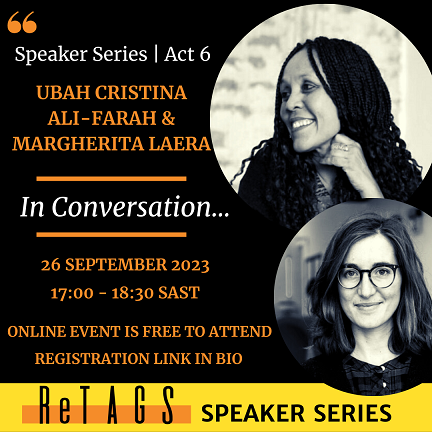
ReTAGS Speaker Series | Act 6 | Ubah Cristina Ali-Farah & Margherita Laera
Act 6 of the ReTAGS Speaker Series. "In Conversation... Antigone and Medea" In this Speaker Series, Margherita Laera (University of Kent) is in conversation with playwright Ubah Cristina Ali-Farah about her Antigone and Medea projects. Presented in person (APGRD, Oxford University) and online (Zoom meeting) on Tuesday 26 September 2023 at 17:00 SAST. Chaired by Clare Finburgh Delijani (Goldsmiths, University of London). Please note, the video has been edited to remove the Q&A section. -
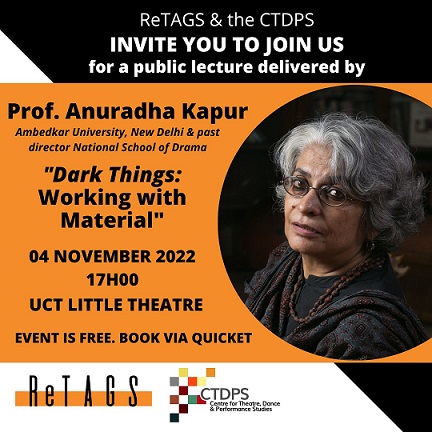
ReTAGS Public Lecture | Prof. Anuradha Kapur
ReTAGS Public Lecture: “Dark Things: Working with Material” delivered by Prof. Anuradha Kapur on the 4 November 2022, at 17h00, at the UCT Little Theatre, Hiddingh Campus. This lecture attempts to reflect on the process of making Dark Things, Ari Sitas’s oratorio on the Silk Road that was performed at the Ambedkar University Campus in April 2018 as part of an elective teaching module. The performance was a collaboration between Ari Sitas, Deepan Sivaraman, Sumangala Damodaran, Purav Goswami, and Anuradha Kapur: all of those collaborating at that time were connected to the AUD in different capacities. Sitas’ oratorio is about the Silk Route and how labour practices that lie in its sub-terrain are topographically sensed in the 21st century. The text talks about the histories of materials: from the miniature screw in the iPhone, a citation from the poems of Xu Lizhi, the Foxconn worker who jumped to death from a Beijing factory building in 2014; to the hangman's rope crafted in a particular region of India; to the bones excavated in war zones; to the harvest of body parts used as visa and ticket to enter a dinghy of migrants; to sewers full of excreta that crisscross the underbelly of Delhi and are cleaned manually, by hand. Their concerns as theatre-makers were to materialize these histories for and in performance. Various registers of labour are part of the process of theatre-making. There is the emotional labour of actors, performers and spectators; there is also the labour of all theatre-makers of crafting and handling objects, scenery, and machinery. This is the very prescript of performance, it's nuts and bolts. Sivaraman, Goswami and Kapur devised improvisations that were often instigated by material. ‘Found’ ditches were experimented with; ‘found’ oil drums were brought in and a gigantic skeletal iron hammer was welded. Being attentive to the social histories of material brought the theatre-makers to plastic, ubiquitous in India even when understood to be toxic - used as rain cover, sack, tent, and precarious shelter in the slums. It was the main material to virtually house thousands of farmers who camped at the Delhi borders for more than a year protesting the corporatization of Indian agriculture. Scenographic decisions by Deepan Sivaraman drew attention to material again; factory-like structures of brick and tin that edged a car park on the campus of Ambedkar University were chosen as the performance site. The dishevelled buildings brought to mind the histories of manufacture in India and the effects and affects of large-scale economic migration that neoliberalism has caused within India itself. Production diaries, notes, drawings; lists of materials that instigated improvisations; the process and record of handcrafting tents and other props; interviews with sanitation workers in Delhi and the ways these entered and contextualized Sitas’s text will be part of this reflection on the material residue of the Silk Road as it subsists in our lives today, as Dark Things. Please note the video presentation has been edited to remove the public response section. ------------------------------------------ Anuradha Kapur is a theatre-maker and teacher. Her theatre work has travelled nationally and internationally, and she has taught in theatre schools and universities in India and abroad. She is a founding member of Vivadi, a working group of theatre practitioners, visual artists, film-makers, musicians and writers. Her writings on performance have been widely anthologized and her book, Actors Pilgrims Kings and Gods: the Ramlila at Ramnagar, was published by Seagull Books, Calcutta (1993, 2004). Anuradha Kapur taught at the National School of Drama for over three decades and was Director of the School between 2007 and 2013. She is presently Visiting Professor at Ambedkar University, Delhi. -
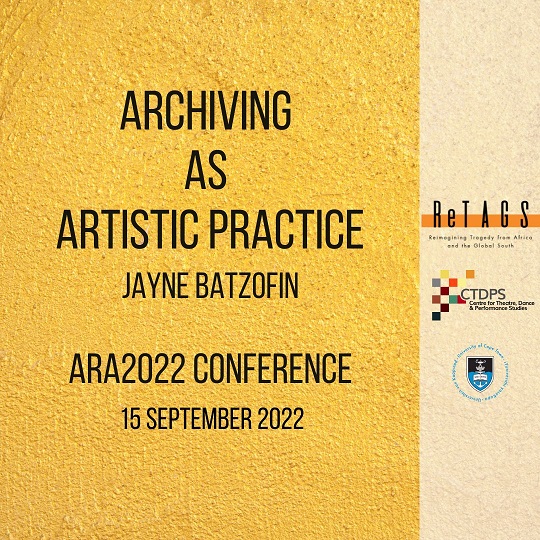
Archiving as Artistic Practice
This paper was presented at the ARA2022 Conference (online) on 15/09/2022 at 15h00 (SAST). The session was chaired by Prof. Christo Doherty (WITS University). The paper looks at the development of establishing an online showcase repository for the ReTAGS’ (Reimagining Tragedy from Africa and the Global South) practice-as-research artistic productions, Antigone (not quite/quiet) and iKrele leChiza, and the methodology behind documenting and digitally archiving their processes. Fundamentally guided by Michel-Rolph Trouillot’s (1995) rationale on history-making, the methodology entailed merging the artistic knowledge produced on the rehearsal floor with the digital humanities practices of ensuring that the data produced is in accordance with the F.A.I.R (Findable, Accessible, Interoperable and Reusable) principles. The digital datasets that have been captured to date are part of an ever-expanding, living archive, with the flexibility of the digital space allowing for the potential to decentre the notion of the archivist as a singular entity and distribute it amongst a community of digital citizens. The aim of producing and expanding on such a rich source of comprehensive datasets is the hope for broadening the possibility for critical engagement and interrogation across the Humanities, to further academic research. Additionally, ReTAGS aims to set precedent for expansive possibilities of using performance practice-based research in producing and publishing academically rigorous data. This paper reflects on my involvement as the digital archivist on the ReTAGS research and my choices made and implemented on the online showcase repository. Considering the strengths and challenges of these archival choices; exploring the possibilities and inviting discussion around archiving for artistic purposes as well as understanding the archive as its own means of artistic engagement. Please note: ARA2022 Conference provided the source of the recording. However, Jayne Batzofin has edited this recording to remove the feedback section with conference participants post the paper presentation. -
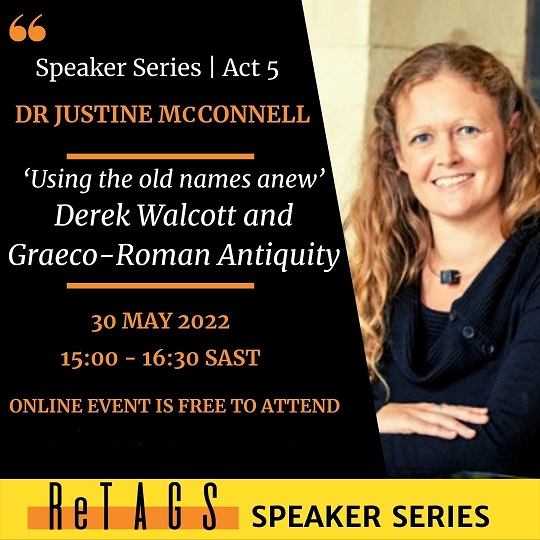
ReTAGS Speaker Series | Act 5 | Dr Justine McConnell
Act 5 of the ReTAGS Speaker Series. "‘Using the old names anew’: Derek Walcott and Graeco-Roman Antiquity" In this Speaker Series, Dr Justine McConnell explores the ways in which the St Lucian poet and dramatist, Derek Walcott, winner of the 1992 Nobel Prize for Literature, re-imagines tragedy, epic, and the myths they retell. Derek Walcott once declared, ‘What is needed is not new names for old things, or old names for old things, but the faith of using the old names anew’. For Walcott, this is a strategy that – far from signalling a derivative aspect in his writing – nurtures the creation of new work that recasts older forms without being overshadowed by them. Famously, Walcott denied that his book-length poem Omeros was an epic, but he went on to qualify that statement by asking us to rethink what we understand by ‘epic’. So too, the title of his drama 'The Isle is Full of Noises' evokes Shakespeare’s 'The Tempest,' but the tale it tells is also of a Philoctetes-figure nicknamed Crusoe and the modern exploitation of St Lucia in the name of tourism; and his early play 'Ione' embeds a mashup of several Greek tragedies (Aeschylus’ 'Agamemnon' and 'Seven Against Thebes', Euripides’ 'Medea' and 'The Bacchae') within a context of Caribbean oral storytelling. Contesting the imperial power dynamics European works have often been used to propagate, Walcott contributes to the creation of a new body of Caribbean literature and asserts a place for Caribbean art in a global, transhistorical canon. Presented online (Zoom meeting) on Monday 30 May 2022 at 15:00 SAST. Chaired by Prof. Mark Fleishman. ------------------------------------------ Justine McConnell is Senior Lecturer in Comparative Literature at King’s College London. She is author of 'Black Odysseys: The Homeric Odyssey in the African Diaspora since 1939' (2013), 'Derek Walcott and the Creation of a Classical Caribbean' (forthcoming, 2023), and, with Fiona Macintosh, 'Performing Epic or Telling Tales' (2020). She has also co-edited four books on the reception of Graeco-Roman antiquity. -
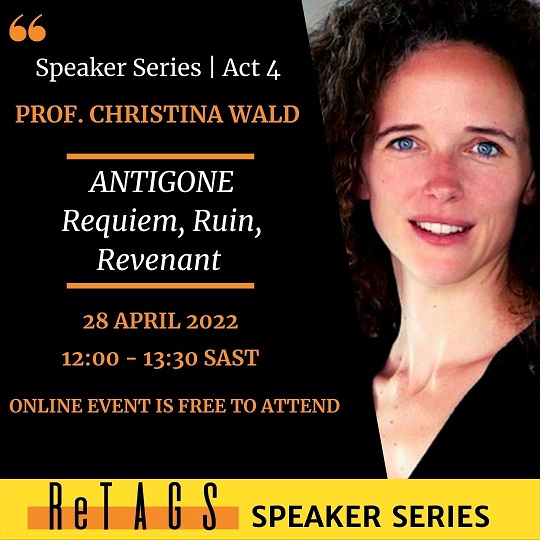
ReTAGS Speaker Series | Act 4 | Prof. Christina Wald
Act 4 of the ReTAGS Speaker Series. "Antigone: Requiem, Ruin, Revenant" In this Speaker Series, Prof. Christina Wald compared Magnet Theatre’s Antigone (not quite/quiet) to a rewriting of Sophocles’ tragedy by the Austrian playwright Thomas Köck that premiered in the same month. Both productions can be described as post-dramatic reassemblages of the Antigone material, both link theatre and theory, both use the chorus as a central creative device and employ a strongly rhythmic language. The different adaptation principles of the plays concern their aesthetic as well as political affordances: Köck’s title calls his version of Antigone a requiem and a recomposition, while director Mark Fleishman describes the production principle of the collaboratively written and choreographed Antigone (not quite/quiet) as ‘ruinous’. The politics of the dead are at the centre of both plays and closely connected to their respective colonial histories and postcolonial challenges. In both dramas, the dead return as revenants: In Köck’s drama, the dead who are washed ashore the European beach are reanimated, reminding Europe of its colonial history and its responsibility for current migration movements, while in Antigone (not quite/quiet) a chorus of Antigone figures in their tomb embodies the liminal state of South African society. Both plays turn Ismene into a problematic identification figure. While in Magnet Theatre’s production she embodies the white ‘leftovers’ in South Africa who are haunted by their historical guilt, Köck’s Ismene struggles to face her postcolonial responsibility. Presented online (Zoom meeting) on Thursday 28 April 2022 at 12:00 SAST. Chaired by Prof. Mark Fleishman. ------------------------------------------ Christina Wald is Professor of English Literature and Literary Theory and Director of the Centre for Cultural Inquiry at the University of Konstanz, Germany. Her research focuses on contemporary drama, performance, film, and TV series as well as on early modern drama and prose fiction with a particular interest in questions of adaptation, intertextuality and cultural transmission. As member of the NOMIS research project ‘Traveling Forms’, she currently pursues a research project on the cultural travels of Greek and Shakespearean tragedy in the globalized present tense. She is the author of Hysteria, Trauma and Melancholia: Performative Maladies in Contemporary Anglophone Drama (Palgrave 2007), The Reformation of Romance: The Eucharist, Disguise and Foreign Fashion in Early Modern Prose Fiction (de Gruyter 2014) and Shakespeare’s Serial Returns in Complex TV (Palgrave 2020). She has co-edited several books, among them The Literature of Melancholia: Early Modern to Postmodern (Palgrave 2011). Recent articles have appeared in Modern Drama, Classical Receptions Journal, Adaptation, The Journal of Commonwealth Literature, Shakespeare and Shakespeare. Survey. -
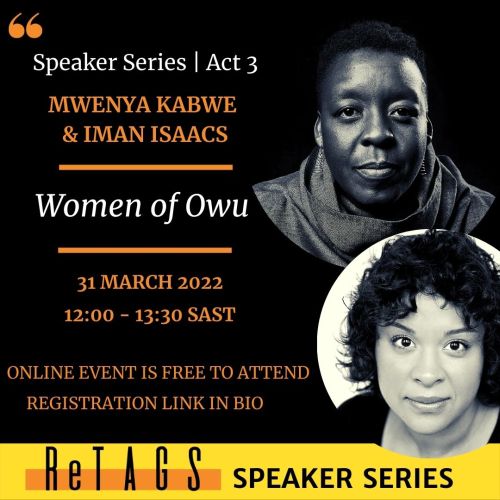
ReTAGS Speaker Series | Act 3 | Mwenya Kabwe & Iman Isaacs
Act 3 of the ReTAGS Speaker Series. This Speaker Series we were delighted to have co-directors, Mwenya Kabwe and Iman Isaacs speaking about their Centre for Theatre, Dance & Performance Studies (CTDPS) production of 'Women of Owu', mounted at the Baxter theatre in 2021, with CTDPS graduating performance students. They discussed their conceptual approaches to the project, the politics of working with a Nigerian adaptation of a Greek text in a South African context, and their exploration of song, animal imagery and costume to create language for an African past, present and future. Presented online (Zoom meeting) on Thursday 31 March 2022 at 12:00 SAST. Chaired by Prof. Mark Fleishman. ------------------------------------------ Mwenya Kabwe is Senior Lecturer at the CTDPS and coordinates the 4th year Acting Studio and course in Professional Practice, as well as conducts postgraduate teaching and supervision. Kabwe is a Zambian-born maker of theatre and performance, facilitator of creative processes, a performer, writer, arts educator, and scholar. Kabwe’s creative practice and research is focused on contemporary African theatre and performance, migration, immersive and site specific performance work, live art, collaborative and interdisciplinary art making and re-imagining African futures. She has lectured at the UCT Drama Department, Wits School of Arts division of Theatre & Performance, and the Market Theatre Laboratory. She is a PhD candidate at the CTDPS and a co-curator of Unrehearsed Futures. Iman Isaacs is a performer, theatre maker, director and educator. She graduated from the University of Cape Town (UCT) with a BA (2011) and a Master’s degree (2018) in Theatre and Performance. Iman has worked and performed both locally and abroad in both the film and theatre industry. In 2016 she was awarded the Distelle Jong Ster award at the Suidoosterfees for her role in Nat (directed by Penny Youngleson). Alongside Raezeen Wentworth, she received a Fleur de Cap and a KANNA nomination for best director for Klippies van die Grond (2018). Iman currently lectures part-time at the Centre for Theatre, Dance and Performance Studies at UCT and teaches Voice as part of Magnet Theatre’s Training Program. -
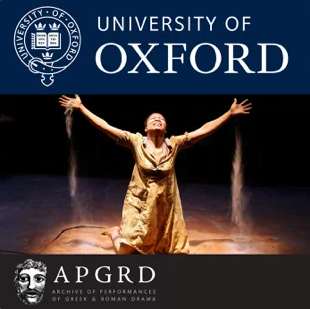
Reimagining Ancient Greece and Rome: APGRD Podcast
A podcast with Mark Fleishman and Mandla Mbothwe Reimagining Tragedy from Africa and the Global South (ReTAGS) is a project led by Mark Fleishman and Mandla Mbothwe. In this episode, Mark and Mandla discuss the project's aims, reimagining the concept of tragedy from a perspective in Africa that is directed at the complex challenges of our global postcolonial present and towards our possible futures both inside and outside of the discipline. Presented by Claire Barnes Production by Giovanna Di Martino and Claire Barnes -
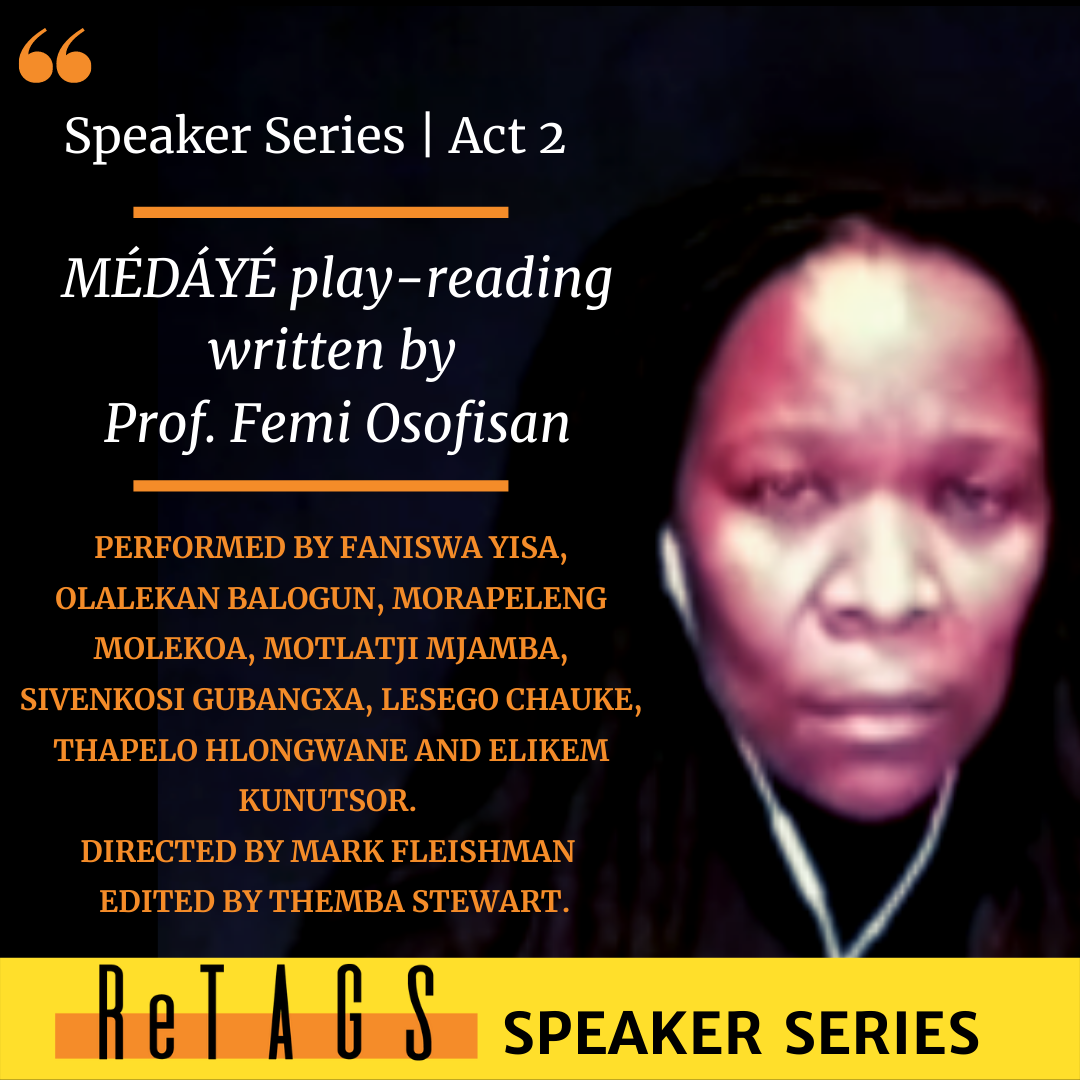
MÉDÁYÉ: A Rehearsal | Play-reading
MÉDÁYÉ: A Rehearsal is a re-reading for the African stage of Euripides' Medea by Prof. Femi Osofisan. This is a new play by Osofisan, currently in its development phase of scripting. The script is still undergoing changes and alterations, so this play-reading should be viewed as part of the script writing development phase, and not a final product. The first readings were performed around Ibadan, Nigeria earlier in 2021. This play-reading was initially streamed online for a limited period in connection with Act 2 of the ReTAGS Speaker Series (presented online (Zoom meeting) on Monday 16 August 2021 at 15:00 SAST.) Performed by Faniswa Yisa, Olalekan Balogun, Morapeleng Molekoa, Motlatji Mjamba, Sivenkosi Gubangxa, Lesego Chauke, Thapelo Hlongwane and Elikem Kunutsor. Directed by Mark Fleishman and edited by Themba Stewart. -
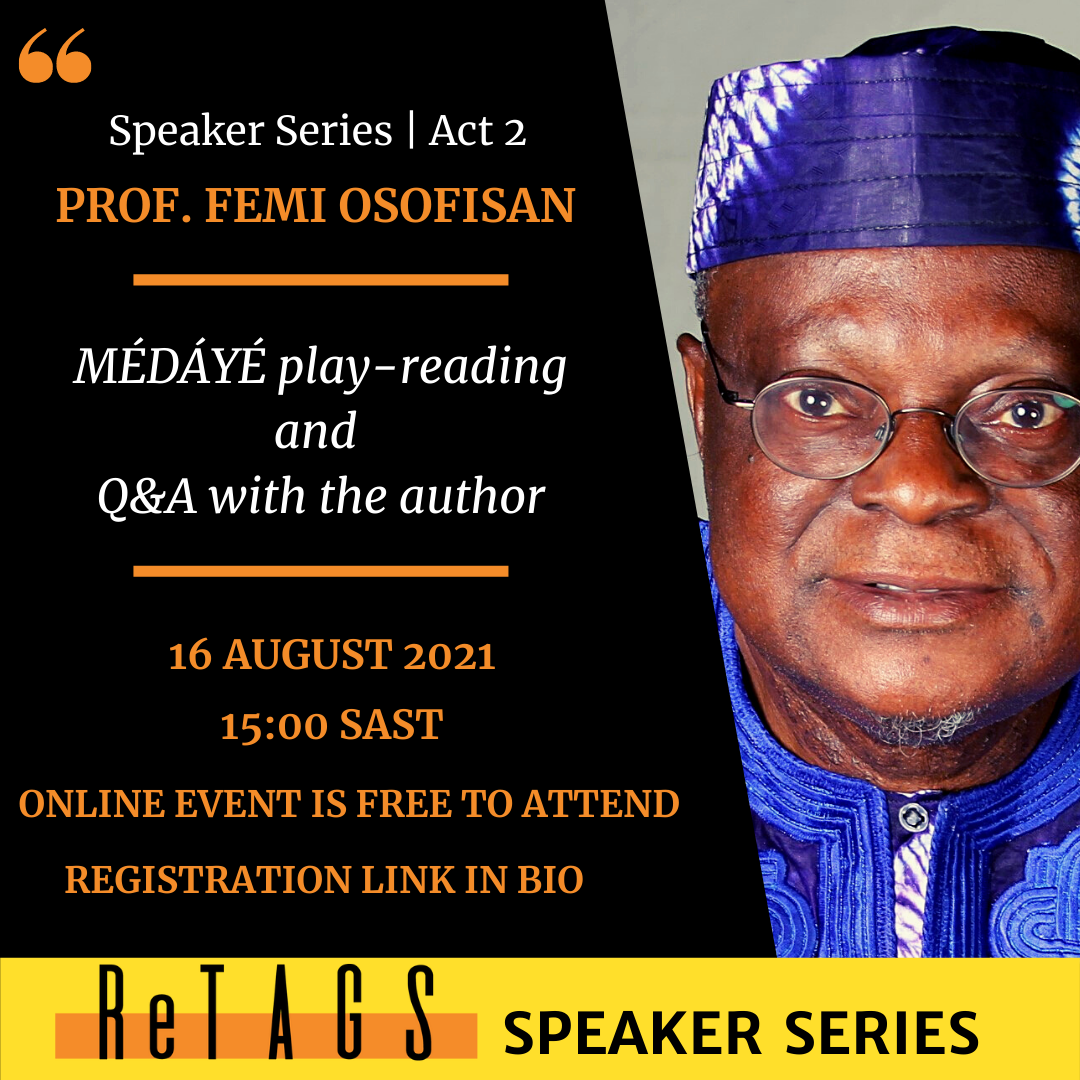
ReTAGS Speaker Series | Act 2 | Prof. Femi Osofisan
Act 2 of the ReTAGS Speaker Series. This Speaker Series took the form of a Q&A with Prof. Femi Osofisan about his latest African tragic adaptation, 'MÉDÁYÉ: A Rehearsal' (a re-reading for the African stage of Euripides' Medea). The adaptation was streamed online (for a limited time with permission from the author) as a play-reading. Performed by Faniswa Yisa, Olalekan Balogun, Morapeleng Molekoa, Motlatji Mjamba, Sivenkosi Gubangxa, Lesego Chauke, Thapelo Hlongwane and Elikem Kunutsor. Presented online (Zoom meeting) on Monday 16 August 2021 at 15:00 SAST. Chaired by Prof. Mark Fleishman. ------------------------------------------ Prof. Femi Osofisan is a critic, poet, novelist, essayist, lecturer, editor, publisher, culture activist, the most prolific, most performed and the most enthusiastically received playwright in Nigeria. He is known for his critique of societal problems and his use of African traditional performances and surrealism in some of his novels. Among the literary awards and commendations he has won are prizes from the Association of Nigerian Authors (ANA) for both drama (1980) and poetry (1989) and in 2004 he was awarded the Nigerian National Order of Merit (NNOM), the highest academic prize in the country. -
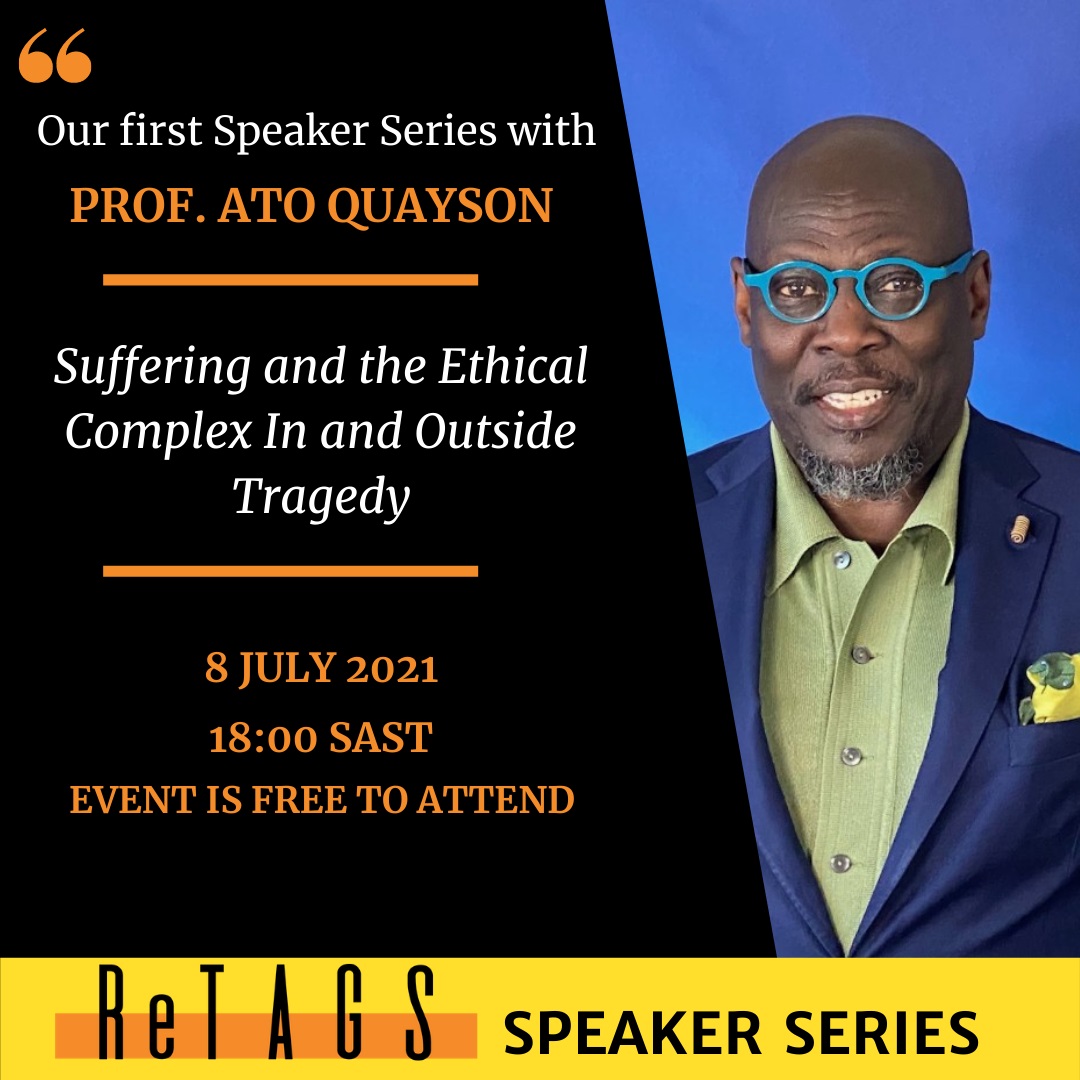
ReTAGS Speaker Series | Act 1 | Prof. Ato Quayson
Act 1 of the ReTAGS Speaker Series. Presented by Prof. Ato Quayson, author of the recently published book 'Tragedy and Postcolonial Literature’ (Cambridge University Press, 2021). Prof. Quayson spoke on the topic of: Suffering and the Ethical Complex In and Outside Tragedy. Presented online (Zoom meeting) on Thursday 08 July 2021 at 18:00 SAST. Chaired by Prof. Mark Fleishman. ------------------------------------------ Prof. Ato Quayson is The Jean G. and Morris M. Doyle Professor of Interdisciplinary Studies at Stanford University, where he has been since 2019. Prior to that he taught at the University of Cambridge, the University of Toronto, and at NYU. He has published 6 monographs and 9 edited collections and is an elected member of the Ghana Academy of Arts and Sciences, the Royal Society of Canada, and of the British Academy. He is an immediate Past President of the African Studies Association and is also general editor of the Cambridge Journal of Postcolonial Literary Inquiry and also curates Critic.Reading.Writing on YouTube. -
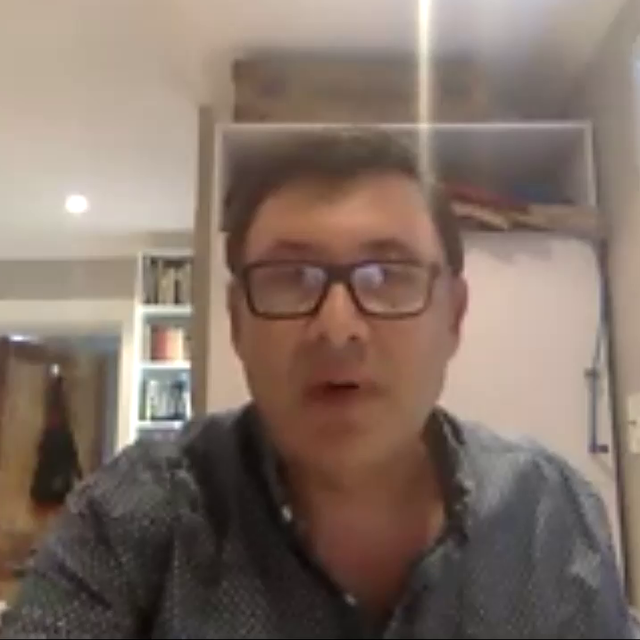
Theatre amongst the ruins: The poetics and politics of South African adaptations
This online public presentation was part of the Politics and Performance Speakers Series. Through the conceptual metaphor of the ruin, the lecture explores the ways in which the classical archive has been mobilized and reinvented by two white theatre-makers in South Africa: Athol Fugard’s production of Orestes in 1971 and my own adaptation of Antigone (not quite/quiet) in 2019. Mark Fleishman is Professor of Theatre in the Centre for Theatre, Dance and Performance Studies at the University of Cape Town. He is also a co-artistic director of Magnet Theatre, an independent theatre company established in 1987. Recent publications: Performing Migrancy and Mobility in Africa: Cape of Flows in the Studies in International Performance series at Palgrave (2015) and two special issues of the South African Theatre Journal on Translation & Performance (2019 & 2020). He is currently principal investigator on the project Re-imagining Tragedy from Africa and the Global South, funded by the Andrew W. Mellon Foundation. -
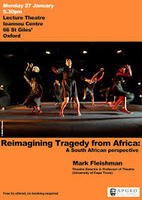
Public Lecture - Reimagining Tragedy from Africa: A South African perspective
In this public lecture, Prof. Mark Fleishman will present the ideas motivating a new five-year project funded by the Andrew W. Mellon Foundation, Reimagining Tragedy from Africa and the Global South. The project sets out to explore tragedy, a concept from the very beginnings of theatre in its European manifestation and therefore of the discipline of Theatre Studies which is decidedly European, and to reimagine it from a perspective in Africa that is at once directed at the complex challenges of our global postcolonial present and towards our possible futures. The presentation will focus on a new production, Antigone (Not quite/quiet), recently produced in Cape Town by Magnet Theatre as part of the broader research project. It will do so against the backdrop of recent social and political events in South Africa and as a development of two earlier works: a version of Medea (1994) at the point at which South Africa was moving from the system of apartheid into a new dispensation, and a version of the Orestes/Electra story, titled In the City of Paradise (1998), in response to the Truth and Reconciliation Commission process a few years later. The latter work was re-staged in 2015 with a new generation of young performers responding to the consequences of the policy of reconciliation proposed by the Mandela government post-1994. The audio has been edited to remove the public Q&A section from the public lecture. -
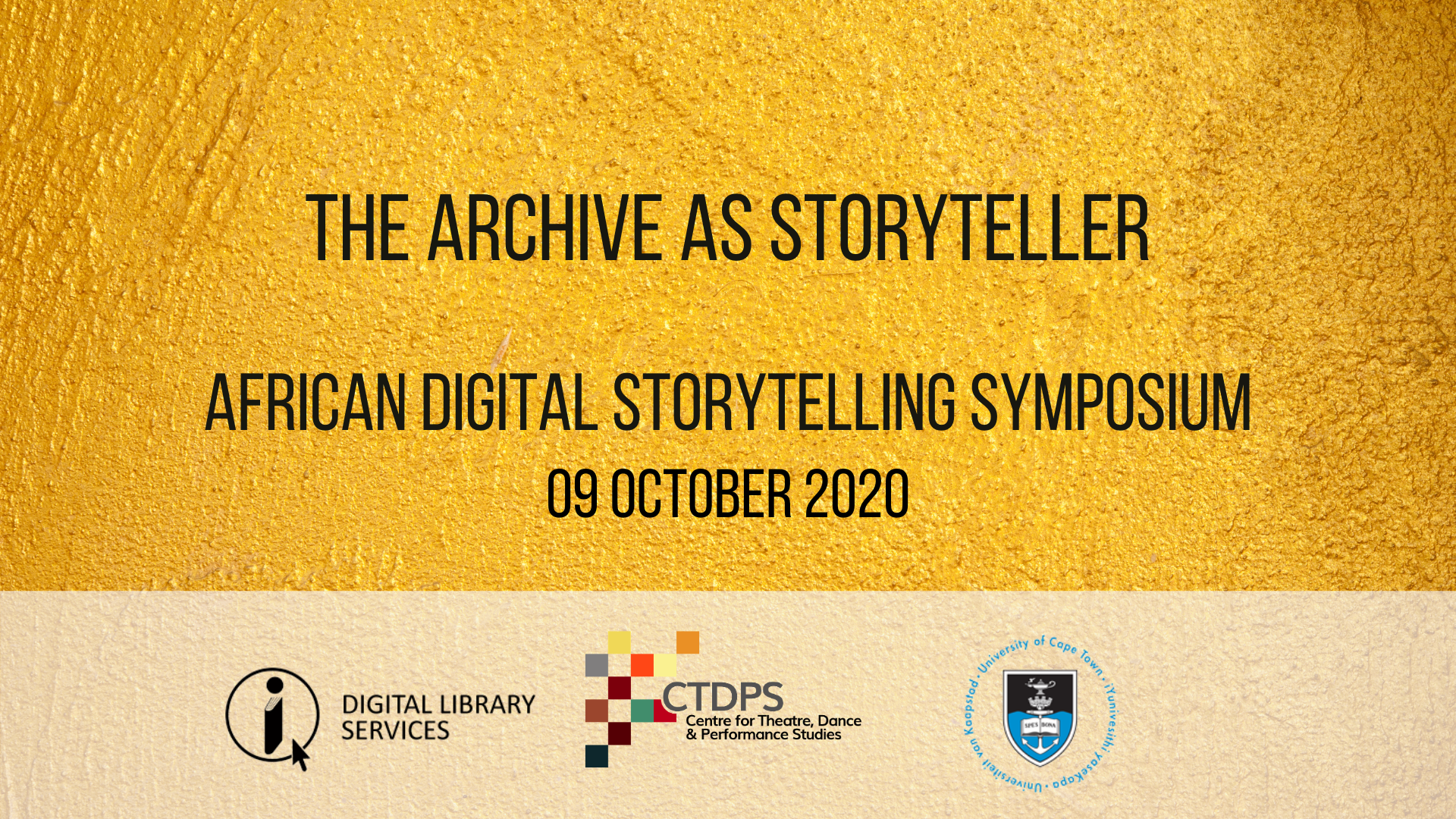
The Archive as Storyteller: Curating Narratives from a Rehearsal Process
Theatre in South Africa is deeply entrenched in the art of storytelling. From the traditions of African oral histories; through to bodies presenting narratives in contemporary performance spaces. We live, speak and move our stories in our embodied performance practices. The RETAGS (Reimagining Tragedy in Africa and the Global South) research project, led by Prof. Mark Fleishman, explores how the form of tragedy has evolved alongside and perhaps influenced the continent’s forms of storytelling. One of the strands of the project is the development of new theatrical performances that interrogate this concept, which is further captured through digital means into audio clips, video segments, image stills and text towards organising an archive. However, performance and its development by its nature is ephemeral, so how can it transform into something digital? And can the digital outputs tell their own stories? This 15 minute presentation was created for the African Studies Department at the University of Kansas, for their virtual Symposium on African Digital Storytelling held on the 09-10-2020 . Dr Sanjin Muftic and Jayne Batzofin outlined the way in which Antigone (not quite/quiet), the first of four practice-based research performances of the RETAGS project, was documented and how the archive is currently being developed in order to share the multiple stories of tragedy on the African continent. Through this we aim to give precedence to the way artists can use performance practice-based research and oral histories as a reputable means by which to produce data, in order to drive and interrogate academic research. TOC 00:00:00 | Introduction 00:00:35 | South African Theatre 00:01:38 | Reimagining Tragedy in African and the Global South (RETAGS) Research 00:03:13 | Theatre and the Connection to the Digital 00:04:53 | Building the Digital Archive/ Data Capturing 00:08:50 | Building the Digital Archive/ Digital Curation 00:11:35 | Showcasing the Digital Archive 00:13:34 | Conclusion Selected References: - Basu, Paul and F. D. Jong. “Utopian Archives, Decolonial Affordances: Introduction to Special Issue.” Social Anthropology 24 (2016): 5-19. - Hall, S. 2001. ‘Constituting an archive’, Third Text 54: 89–92. - Mbembe, Achille, and Bregtje van der Haak. 2015. “The Internet Is Afropolitan.” The Chimurenga Chronic New Cartographies. March 17. Accessed August 12, 2015. http://chimurengachronic.co.za/the-internet-is-afropolitan/. - Mignolo, W. D. 2011. The darker side of western modernity: global futures, decolonial options. Durham, NC: Duke University Press. - Munoz, T. 2012. Doing Digital humanities in the library isn't a service. Available: http://trevormunoz.com/notebook/2012/08/19/doing-dh-in-the-library.html. Accesses 25 August 2019. - Sant, T. (2017), Documenting Performance, Bloomsbury UK. Scheub, H. 1996. The Tongue Is Fire : South African Storytellers and Apartheid. Madison: University of Wisconsin Press. - Stoler, A. L. 2009. Along the archival grain: epistemic anxieties and colonial common sense. Princeton, NJ: Princeton University Press. - Trouillot, M.-R. 1995. Silencing the past: power and the production of history. Boston, MA: Beacon Press. -
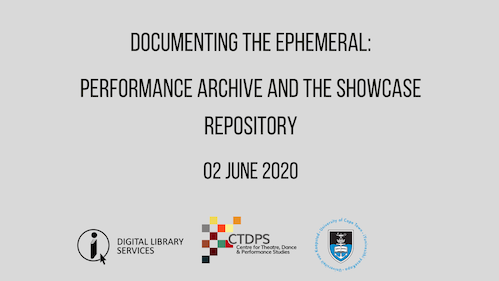
Documenting the Ephemeral: Performance Archive and the Showcase Repository
This 12 minute presentation was created for the Open Repositories 2020 Virtual Conference held on the 02-06-2020. Dr Sanjin Muftic and Jayne Batzofin present their work on the capturing, curating and relevancy of developing an online open access repository (Omeka S) for the rehearsal process of performance making within the RETAGS project at the University of Cape Town. The Reimagining Tragedy in Africa and the Global South (RETAGS) project (PI - Dr. Mark Fleishman) has embarked on a five year staging of events and field research to investigate the restaging and reimagining of tragedy on the African continent through performance. During their development process of their first production, Antigone (not quite/ quiet), they documented their rehearsal processes through digital means. This resulted in 1.8TB of data consisting of video and audio recordings of daily rehearsals and performances, audio interviews with the creative team, stills from the design elements, and texts such as scripts and actor’s notebooks. The dataset is unique, comprehensive and loaded with local knowledge. The presentation talks through the process of data curation towards the publishing in an online repository. It looks at the steps in data management, metadata capture, schema creation and the discussions around publishing. The presentation will highlight the challenges posed by this “living performance archive” in terms of making data Findable Accessible Interoperable and Reusable (FAIR), as well as issues around copyright, data protection and ownership. Using the theatrical example of RETAGS, this presentation makes some recommendations for structures in developing a repository of theatrical productions. TOC 00:00:00 | Introduction 00:02:14 | Process of Capturing 00:04:45 | Process of Curating 00:08:10 | Questioning Relevancy 00:10:50 | Conclusion


